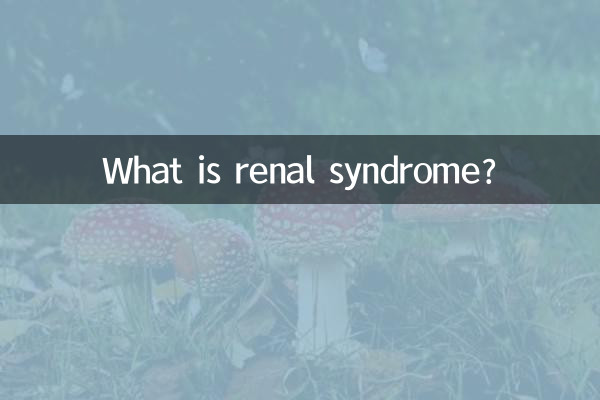What is renal syndrome?
Nephrotic Syndrome is a kidney disease caused by a variety of causes, with massive proteinuria, hypoalbuminemia, edema and hyperlipidemia as the main clinical manifestations. In recent years, with the improvement of health awareness, topics related to renal syndrome have gradually become the focus of public attention. This article will combine the hot topics and hot content on the Internet in the past 10 days to provide you with a detailed analysis of the causes, symptoms, diagnosis and treatment of renal syndrome.
1. Causes of renal syndrome

The causes of renal syndrome are complex and diverse, and can be divided into two categories: primary and secondary. Here is a summary of common causes:
| Classification | specific cause |
|---|---|
| primary renal syndrome | Minimal change nephropathy, membranous nephropathy, focal segmental glomerulosclerosis, etc. |
| secondary renal syndrome | Diabetic nephropathy, systemic lupus erythematosus, allergic purpura, viral infections (such as hepatitis B, hepatitis C), etc. |
2. Main symptoms of renal syndrome
Typical symptoms of renal syndrome include:
| symptom | describe |
|---|---|
| proteinuria | Significant increase in protein content in urine, manifested as foamy urine |
| hypoalbuminemia | Decreased protein levels in the blood, leading to edema |
| Edema | Commonly seen on the eyelids, face and lower limbs, and can spread to the whole body in severe cases |
| hyperlipidemia | Increased levels of cholesterol and triglycerides in the blood |
3. Diagnosis and examination of renal syndrome
The diagnosis of renal syndrome requires a combination of clinical symptoms and laboratory tests. The following are common test items:
| Check items | significance |
|---|---|
| Urine routine | Test urine protein content |
| 24-hour urine protein quantification | Assess the severity of proteinuria |
| blood biochemistry test | Detect serum albumin, cholesterol and other indicators |
| kidney biopsy | Identify pathological types and guide treatment |
4. Treatment of renal syndrome
The goals of treatment for renal syndrome are to control symptoms and delay disease progression. The following are common treatments:
| Treatment | Specific content |
|---|---|
| drug treatment | Glucocorticoids, immunosuppressants (such as cyclophosphamide), diuretics, etc. |
| Diet management | Low-salt, high-quality protein diet, control fat intake |
| Prevention and treatment of complications | Prevent complications such as infection and thrombosis |
| Traditional Chinese Medicine Conditioning | Assisted use of traditional Chinese medicine to improve kidney function |
5. Prevention and daily care of renal syndrome
The key to preventing renal syndrome lies in controlling the underlying disease and living a healthy lifestyle:
1.Control underlying diseases: Such as diabetes, hypertension, etc., monitor kidney function regularly.
2.healthy eating: Reduce the intake of high-salt and high-fat foods and eat more fresh fruits and vegetables.
3.moderate exercise: Enhance physical fitness and avoid overexertion.
4.Regular physical examination: Early detection of kidney problems and timely intervention.
6. Analysis of hot topics on the entire network
In the past 10 days, discussions about renal syndrome have mainly focused on the following aspects:
| hot topics | focus of discussion |
|---|---|
| renal syndrome in children | Parents pay attention to early symptoms and treatment of kidney disease in children |
| Renal syndrome and COVID-19 vaccine | Exploring the risks of vaccination for people with kidney disease |
| Traditional Chinese Medicine Treats Renal Syndrome | The efficacy and controversy of traditional Chinese medicine conditioning |
| diet therapy | Discussion on the feasibility of low-protein diet |
Conclusion
Renal syndrome is a chronic disease that requires long-term management, and early diagnosis and standardized treatment are crucial to improving prognosis. Through the structured analysis of this article, we hope to help you fully understand this disease. If you or someone around you develops related symptoms, it is recommended to seek medical treatment promptly to avoid delaying treatment.

check the details

check the details